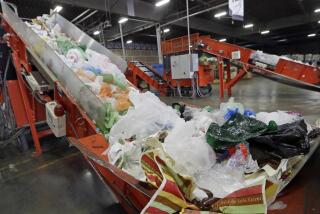It’s time for some L.A. trash talk — seriously
- Share via
Darrell Mahler of Topanga thought he was on to something good when he saw an insert with his most recent garbage bill inviting him to apply for a 25% senior discount.
Mahler, 72, did the math and realized this would lower his monthly charge from $35.32 to $26.49. But when he contacted the garbage company, Universal Waste Systems, he was told that, as part of the deal, he’d have to replace his 96-cubic-foot bins with 32-cubic-foot bins.
Think about that. In return for a 25% cut in his garbage bill, Mahler and his wife would have to accept a nearly 67% reduction in the amount of trash they could dispose of.
“They must think all seniors are senile,” Mahler told me.
I’ll let you know in a moment what Universal Waste Systems had to say about this. But first, let’s get our hands dirty with a few other garbage matters.
The Los Angeles Bureau of Public Works held a public hearing this week on trash collection from businesses and large apartment buildings in the city. That’s not normally the sort of thing that attracts a lot of attention, but this time it was different.
In some areas, a single garbage-collection company may contract with municipal authorities for a specific route. In others, dozens of private firms may duke it out for big, waste-producing buildings in the same neighborhood.
In these latter cases, environmental and labor groups are squaring off against business interests over a proposal to switch from the current system of largely unregulated garbage collection — with loud, rumbling trucks from about 140 firms serving customers — to having only one company responsible for each of 11 geographic zones.
The city’s Bureau of Sanitation says the change would force commercial waste haulers to recycle more of the trash they pick up through a well-enforced quota system. The goal is to divert as much as 90% of waste from landfills by 2025.
Business groups say the switch would eliminate competition and cause rates to go up. But what they’re apparently more concerned about is making it easier for unions to organize garbage workers.
“It’s much easier to organize 11 companies than it is 140 companies,” said Carol Schatz, president of the Central City Assn., a business group.
To be honest, I’m surprised that garbage collection isn’t already heavily unionized. Granted, most of what I know about the industry I learned from “The Sopranos,” but I’d have thought waste companies and their related unions would have plenty in common.
In any case, unionization should be the least of the industry’s worries. Worker safety and environmental considerations should be top of the list, especially as our hyper-consuming society continues generating more and more trash, much of it toxic in nature, and as places to get rid of it become harder to find.
L.A. County generates about 19 million tons of waste and recyclable materials annually and sends nearly 9 million tons of trash to landfills, according to the Department of Public Works.
The city of L.A. is responsible for about a third of the county’s waste, with businesses and large apartment complexes accounting for nearly 70% of the city’s total.
Southern California already has a pretty good track record when it comes to recycling. Only about 45% of L.A. County’s garbage ends up in landfills.
At the national level, Americans generate about 250 million tons of trash annually, only a third of which ends up recycled, according to the Environmental Protection Agency.
More than half the country’s garbage gets dumped into landfills, the EPA says. Meanwhile, the number of available landfills has steadily declined over the years — down almost 80% since 1988 — although the size of many remaining landfills has grown.
Bahman Hajialiakbar, principal engineer with the Environmental Programs Division of the Department of Public Works, said L.A. County’s garbage issues look fairly manageable for the next 15 years. After that, maybe not so much.
“Based on our best estimates of the economy improving and the population growing, it starts to get complicated after 15 years,” Hajialiakbar said.
The important thing, he added, is that people become more aware of the issues we face and step up their recycling efforts.
Which brings us back to Mahler and his incredible shrinking garbage bins. Here’s a guy who’s thinking about his trash but doesn’t want to be penalized just for accepting a senior discount.
Matt Blackburn, general manager of Universal Waste Systems, told me the discount is intended to reflect lifestyle changes as people age. “The whole idea is that seniors are probably producing less waste than younger people,” he said.
And maybe that’s true. But there’s a snag: Although anyone over 62 is eligible for the senior discount, Universal Waste Systems won’t require you to get smaller garbage bins if you qualify as a low-income person. In that case, you get your discount and can dispose of as much trash as before.
Middle-class and more prosperous seniors can only enjoy the discount if they inexplicably agree to use the smaller bins. “Don’t blame us,” Blackburn said. “The county makes the rules.”
So what’s the deal? Why aren’t all seniors treated the same?
Hajialiakbar at the Department of Public Works had no answer to that question. “It’s something we need to look into,” he said.
Here’s my suggestion: If it’s true that seniors produce less trash, then give them all a discount and switch them all to smaller bins.
Better still, give everyone a discount if they can improve their recycling — that is, get by with a smaller black bin and a bigger blue bin.
These are important issues. Squabbling over union moves notwithstanding, the key thing waste authorities should be conveying to consumers is that we consume too darn much – and it all has to end up somewhere eventually.
Better we dispose of these problems before they really start to stink.
David Lazarus’ column runs Tuesdays and Fridays. He also can be seen daily on KTLA-YV Channel 5. Send your tips or feedback to david.lazarus@latimes.com.
More to Read
Inside the business of entertainment
The Wide Shot brings you news, analysis and insights on everything from streaming wars to production — and what it all means for the future.
You may occasionally receive promotional content from the Los Angeles Times.











